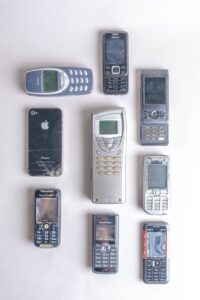5.3bn mobile phones to be thrown away this year alone
Experts believe roughly 5.3 billion mobile phones and smartphones will be discarded this year and are calling for their proper disposal this International E-Waste Day.
If these phones were stacked on top of each other, at an average depth of 9mm, the disused phones would reach around 50,000km tall – 120 times higher than the International Space Station.
But what many people don’t realise is just how valuable these gadgets are, often made form gold, copper, silver, palladium and other components which can be recycled.
 The Waste Electrical and Electronic Equipment (WEEE) Forum, which organised the event, say most people store their old phones in drawers and garages or throw them into bins bound for landfill.
The Waste Electrical and Electronic Equipment (WEEE) Forum, which organised the event, say most people store their old phones in drawers and garages or throw them into bins bound for landfill.
Director General of the WEEE Forum, Pascal Leroy, said: ‘We focussed this year on small e-waste items because it is very easy for them to accumulate unused and unnoticed in households, or to be tossed into the ordinary garbage bin. People tend not to realise that all these seemingly insignificant items have a lot of value, and together at a global level represent massive volumes.
A survey by the organisation found the average European household, in Portugal, the Netherlands, Italy, Romania and Slovenia, hoards 13 e-products, with eight working and four broken.
46% of respondents said they kept these unused items in the house because they ‘might use it again in future’, while 15% said they planned on selling them or giving them away. 7% also said they didn’t know how to dispose of them.
Despite the forum collecting and recycling more than 30 million tonnes of e-waste and spending huge amounts on communication campaigns over the years, challenges remain.
Virginijus Sinkevičius, European Commissioner for the Environment, Oceans and Fisheries, said: ‘The continuing growth in the production, consumption and disposal of electronic devices have huge environmental and climate impacts. The European Commission is addressing those with proposals and measures throughout the whole product life-cycle, starting from design until collection and proper treatment when electronics become waste.
‘Moreover, preventing waste and recovering important raw materials from e-waste is crucial to avoid putting more strain on the world’s resources. Only by establishing a circular economy for electronics, the EU will continue to lead in the efforts to urgently address the fast-growing problem of e-waste.’
The materials found in electronic devices can be re-used to develop important technologies like wind turbines, electric car batteries and solar panels.
Today the UN has also released a thought paper exploring ways to tackle this global issue, including deposit return schemes, digital product passports and enforcing minimum legal obligations on entities with access to e-waste.
The UN Institute for Training and Research (UNITAR) has also launched the first e-waste online training 1.5 hour course anyone can join, with certificates available to graduates.
Photo by Rayson Tan















